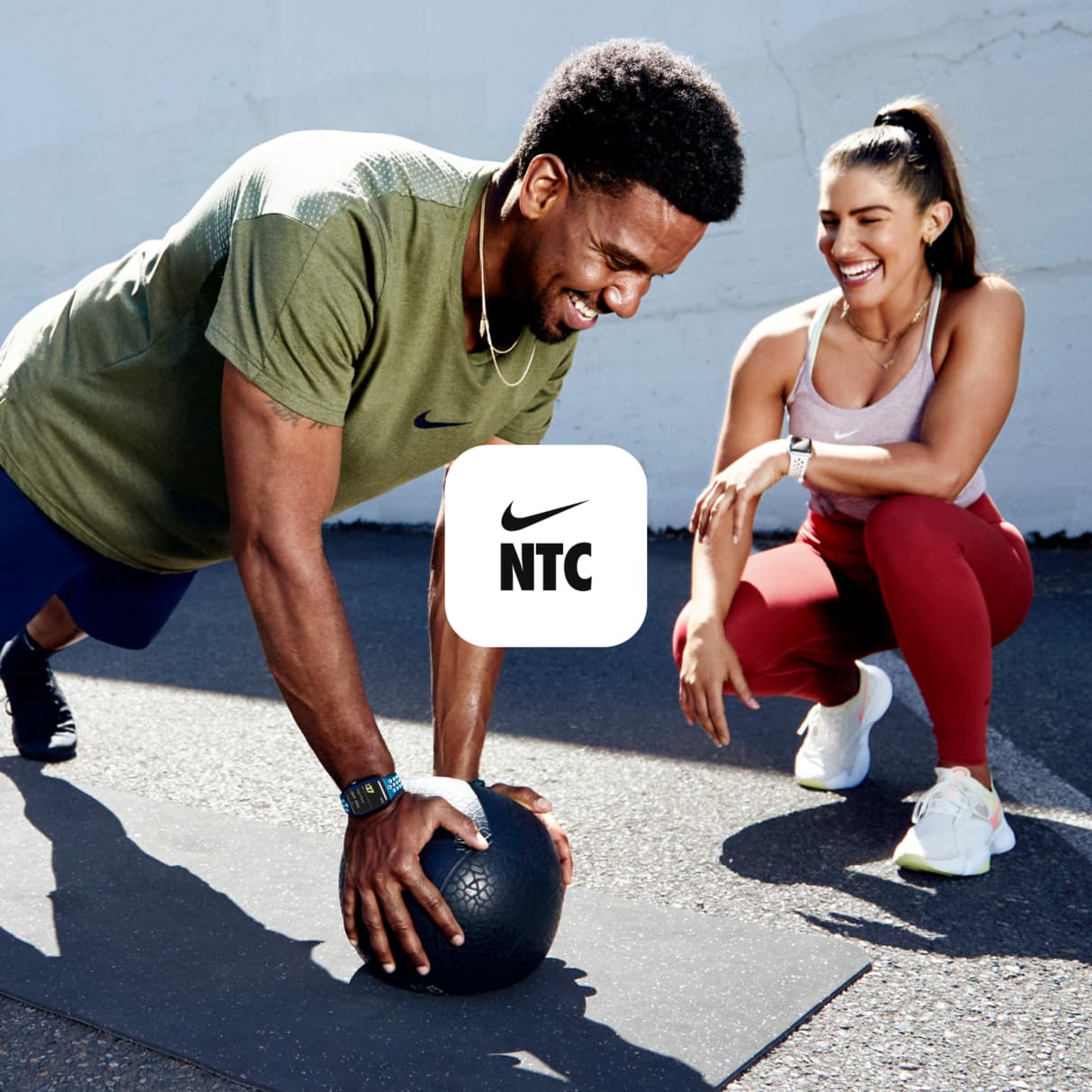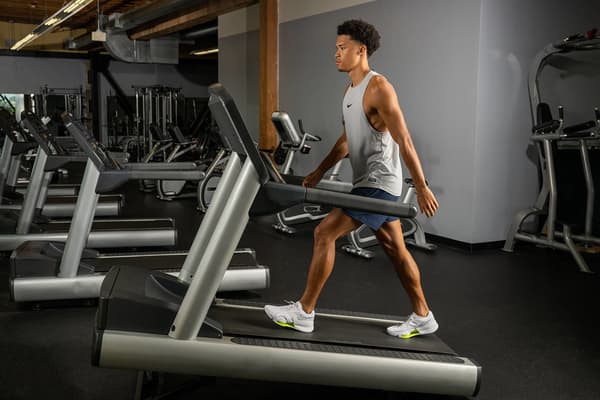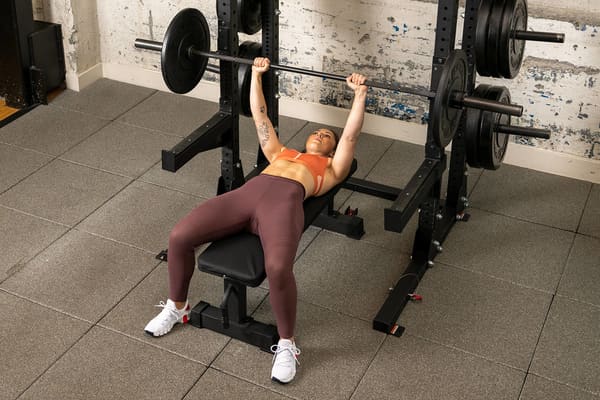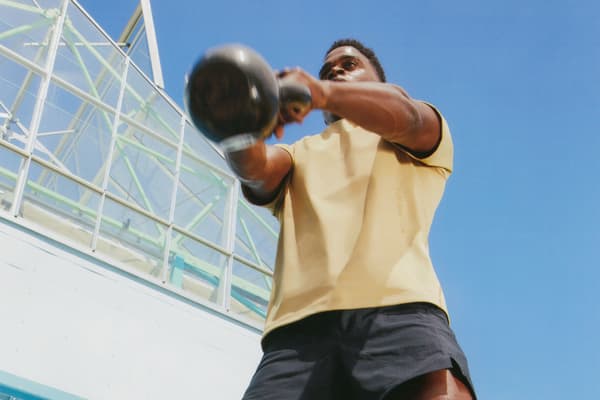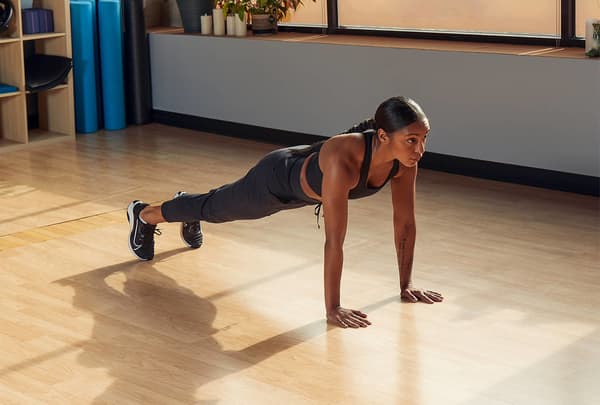How To Do a Handstand Push-up, According to CrossFit Coaches
Sport & Activity
CrossFit experts explain how to do handstand push-ups and offer helpful tips on how to master the move.

Learning how to do a handstand push-up takes patience and consistency—and, of course, a lot of strength. Below, CrossFit coaches—experts on the move—provide instructions for how you can master handstand push-ups.

How To Do Handstand Push-ups
When it comes to training, "you've got to break it down into two things. You've got to break it down into a strength component and a skill component", said Hayden-William Courtland, PhD, Level 3 CrossFit coach.
Strength is a physiological adaptation, and you need to have enough upper-body strength to exert force against an external resistance, which, in this instance, is pressing your bodyweight against the ground, Courtland explained.
(Related: The Top Bodyweight Chest Workout, According to Trainers)
"The stronger you are, the easier it's going to be. So doing some sort of strength training programme focusing on upper-body strength is going to be super-helpful. And everyone should pretty much do that in general if they're going to do any kind of CrossFit or any kind of fitness or sport", he said.
If you're new to strength training, it's key to learn proper movement patterns with just your bodyweight before adding weight or complexity. But it will only get you so far—it's a challenge to continue increasing strength solely with bodyweight movements.
If you already have experience with training and have nailed down the proper movement patterns, Courtland said to focus on doing barbell lifts as you'll be able to incrementally increase the weight as you build strength. To build the strength needed to perform a handstand push-up, he recommended adding lifts such as an overhead barbell press, bench press and chin-up into your upper-body strength routine.
Quinton Huguley, CrossFit Level 2 coach, USA Weightlifting Level 1 coach, said that building upper-body strength is important and recommended adding exercises such as the seated, alternating dumbbell press into your routine.

How To Practise Handstand Push-ups
You can also improve your strength and build up to handstand push-ups by placing your feet on top of a box and practising push-ups from this inverted position. And if you haven't conquered push-ups, start with the basics: performing them on your knees, then progressing to doing them on your toes, then working your way up to elevating your feet and becoming more vertical through the torso.
Huguley likes to start off his athletes by beginning in a high plank position and then walking the hands back so that you get into a Downward-Facing Dog position (as long as there are no shoulder-mobility issues). Starting here will not only help warm up the shoulder muscles, but will also help strengthen those muscles, all while getting accustomed to the inverted position.
While your arms are doing the majority of the work, it's imperative to focus on your core strength to be as efficient as possible in the handstand push-up position. If you don't have enough core strength, once you kick up against the wall and do a push-up, your lockout (the final portion of the handstand with your limbs/joints fully extended) will be curved, Courtland said.
"You'll have an arch in your back. It's not a strong position. It's not a really comfortable position to be in", he said. Plus, it's inefficient and goes against CrossFit standards since your back will be arched and you'll be "broken" at the hips, meaning there isn't a straight line from your head to your feet, he said.
If you're not doing them already, work on core-stability exercises such as dead bug, alternating arm and leg reaches (also known as the bird dog) and the traditional plank, as this type of exercise "directly correlates to that inverted, upside-down position when you're at the top position on the wall", Huguley said. And these moves also help train how to engage your core while in motion, he added.
Courtland recommended adding movements like V-ups and sit-ups, but if you only choose one core exercise to add to your routine, it should be the hollow hold, because "that's basically the shape you're trying to go for when you're in a handstand", he said.

How To Do a Hollow Hold
When performing a hollow hold, focus on maintaining a nice, smooth curve from your arms extended overhead behind you, all the way down to your toes. If you're new to the movement, start by lying on the ground with your legs extended in front of you and your arms extended overhead. With control, simultaneously lift your arms and legs a few inches off the ground, maintaining full extension of your limbs and keeping your core engaged the entire time.
This will probably be hard in the beginning, but you can build up to it. To modify the hollow hold, drop your hands down by your sides or tuck both knees in. You can then progress to one knee tucked and one leg extended until you're able to hold this position confidently with both legs and your arms extended.
Courtland recommended practising this position as much as possible and focusing on that "banana" shape because it's specific to the position you'll ideally be in when you're inverted. He also recommended spending time perfecting your hollow hold because your body will try to bend the other way if you don't have enough strength to maintain this position—which is also what keeps you vertical in a handstand.
Because the handstand push-up exercise places a lot of impact on your joints—particularly those in your wrists and shoulders—you'll want to warm up your joints and take them through a range of motion that is as close to your end range as possible, before stressing them with reps and volume, Courtland said.
This will also help to improve your overall range of motion, get into the proper handstand push-up position and prevent the risk of injury. If you already have a good range of motion, Courtland recommended spending time warming up your shoulders and wrists with movements such as pass-throughs and scapular pull-ups and retractions.
When it comes to the skill portion, Courtland said you need to be able to control your body in space and have the balance and coordination to do so. "It comes down to getting the proper base of support and the set-up, which is going to be inverted", he said.
You should think of your hands and the top of your head as making a tripod position to create this base, with your head acting as the top of the triangle and your right and left hands acting as the right and left sides of the triangle. This is your starting position. From here, the goal is to get your body in the position to press up, which can be tricky and ultimately boils down to your upper-body strength, Courtland explained.
Focusing on your upper-body strength and core strength, kicking up into a handstand and holding a handstand against a wall is the formula for nailing a handstand push-up, according to Courtland. Practising negative eccentric handstands, where you begin fully extended in a handstand position and then lower down into the tripod position, will also help you improve your ability to do handstand push-ups.

How To Improve Handstand Push-Ups
Now that you've got the basics, it's time to perfect the move. Courtland said to continue focusing on engaging your core and maintaining the tripod position throughout the entire movement, as many people tend to fall out of it.
Additionally, working on free-standing handstands will improve your handstand push-ups. When practising your free-standing handstand, Courtland said to focus on staying vertical and to work towards holding this handstand for longer amounts of time, helping to develop body awareness, control and balance.
This will help you graduate to doing handstand push-ups against a wall because the wall will become less of a crutch or support, allowing for smooth movements. It's also important to continue focusing on increasing your upper-body strength because "the stronger you are, every repetition you do becomes more sub-maximal", he said.
"The one thing that we tend to lose when we do handstand push-ups, especially at high volumes, is we start losing tension, so I always say, 'Squeeze your glutes or squeeze your core,'" Huguley said.
Most importantly, both coaches encourage being patient and not rushing the process or cutting corners and focusing on form and technique before adding speed and intensity into the mix.
Words by Tamara Pridgett
